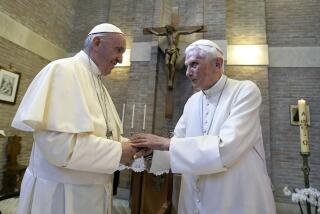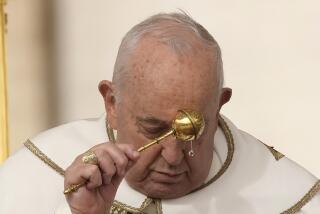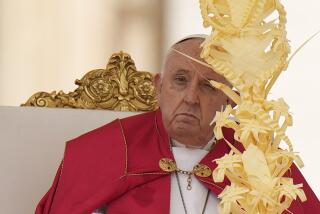Pope seeks to shift Catholic Church’s priority from dogma to mercy
ROME — In an extraordinary, wide-ranging interview, Pope Francis expressed frustration that the Roman Catholic Church is “obsessed” with issues such as abortion, homosexuality and contraception, and called instead for a focus on healing and mercy.
“The church sometimes has locked itself up in small things, in small-minded rules,” Francis said in the interview published Thursday by an Italian Jesuit magazine. “The people of God want pastors, not clergy acting like bureaucrats or government officials.”
The 12,000-word interview, which lighted up social media and jolted Catholic commentators worldwide, buttressed impressions that the new pope is far less interested in reinforcing orthodoxy and dogma than his immediate predecessors were, and that he sees his role as essentially pastoral.
As striking as some of his language was, however, Francis did not call for any changes in Catholic doctrine, only a reordering of priorities.
“The church’s pastoral ministry cannot be obsessed with the transmission of a disjointed multitude of doctrines to be imposed insistently,” he said. “We have to find a new balance; otherwise even the moral edifice of the church is likely to fall like a house of cards, losing the freshness and fragrance of the Gospel.”
That, he said, meant a change of style.
“We cannot insist only on issues related to abortion, gay marriage and the use of contraceptive methods. This is not possible. I have not spoken much about these things, and I was reprimanded for that.
“But when we speak about these issues, we have to talk about them in a context. The teaching of the church, for that matter, is clear and I am a son of the church, but it is not necessary to talk about these issues all the time.”
Polls have consistently shown that in the United States, Western Europe and parts of Latin America, the church is out of step with the larger society on certain social issues, especially contraception and homosexuality.
Instead of arguing doctrine, Francis said, the church should pay more attention to helping the poor and disenfranchised, the dominant message of his papacy so far.
“I see the church as a field hospital after battle,” he said. “It is useless to ask a seriously injured person if he has high cholesterol and about the level of his blood sugars! You have to heal his wounds. Then we can talk about everything else.”
The interview with La Civilta Cattolica, whose contents Francis previewed and approved for publication, was the latest indication of his intention to move the church away from the “culture wars” it has recently engaged in. The interview was also published online in a U.S.-based Jesuit journal, America.
Francis is the first Jesuit pope, and much of the interview deals with his Jesuit background and how it has influenced him.
The pope acknowledged that some Catholics have reproved him for not having spoken much on abortion and same-sex marriage. But the pontiff insisted that love and compassion were primary.
“He said the same things that the church has always said. But he put his accent on mercy,” said Marco Tosatti, a veteran Vatican watcher with Italy’s La Stampa newspaper. “It’s certainly different from Benedict and John Paul II.... He prefers to say, well, we must concentrate more on mercy and leniency than on the legalistic way of putting things.”
Tosatti said the shift in tone by itself will alarm conservative clerics and laypeople who fear that Catholic teachings, and the church’s mission, are being diluted.
“The conservatives in every country will certainly say, ‘Listen, we are now facing in the whole Western world a social attack on values. And that’s not a problem of mercy,’” Tosatti said.
However, Ashley McGuire, a spokeswoman for the conservative Catholic Assn., praised the pope’s comments and said he was “not in any way proposing that the church should abandon important moral and social teachings. Rather, the pope is reaffirming a long-standing teaching that reaches all the way back to the founding of Christianity: love your neighbor.”
On the other side of the spectrum, the Human Rights Campaign, a lesbian, gay, bisexual and transgender advocacy group, tweeted an image with the words, “Dear Pope Francis, thank you. — LGBT people everywhere.”
The interview underscored the sea change that Francis has brought to the papacy in just six months on the job. The first pope from Latin America has galvanized millions of followers with his emphasis on personal humility and on reaching out to the marginalized, transforming the pontificate, which had come to seem aloof and alien to many Catholics and non-Catholics under his more academic predecessor, Benedict XVI.
Dubbed the “world’s parish priest” by the Italian media, Francis has washed the feet of juvenile delinquents, paid tribute to immigrants and kissed countless babies. He has phoned ordinary people who write to him with their problems.
Exhibiting the same indifference to worldly comforts he showed as archbishop of Buenos Aires, he has eschewed some of the trappings of his office, including richly decorated ceremonial garb, and has opted to live in a guesthouse on the Vatican grounds instead of the grand Apostolic Palace that looms over St. Peter’s Square. (In the interview, he recalled walking into the palace after his election, and “inside myself, I distinctly heard a ‘no.’”)
Recently, he accepted the gift of a car from another priest: a 1984 Renault with nearly 200,000 miles on it.
The interview demonstrated that those gestures “are not just a PR act,” said the Rev. Paul Crowley, a Jesuit priest who teaches religious studies at Santa Clara University in the San Francisco Bay Area. “His whole approach to the papacy … is going to be different from what we might have been accustomed to.”
Crowley said that the interview will upset some on either extreme of the church’s doctrinal divide, but that it was significant the pope was talking about issues “that previously seemed to not even be discussable.”
Francis said, for instance, that it was time to “investigate further the role of women in the church,” although he also emphasized that “a woman has a different makeup than a man.” The church has resisted the ordination of women as priests and has upbraided U.S. nuns for diverging from dogma.
It was Francis who raised the topic of homosexuality in the interview. “A person once asked me, in a provocative manner, if I approved of homosexuality,” he said. “I replied with another question: ‘Tell me: when God looks at a gay person, does he endorse the existence of this person with love, or reject and condemn this person?’”
Two months ago, he caused a stir by telling reporters, “If a person is gay, seeks God and has good will, who am I to judge?”
“This is someone who is intensely pastoral, so he comes from that as his starting point,” said Matthew Bunson, editor of the Catholic Almanac. “Whereas someone else might come at it from the standpoint of pure dogmatic theology, this pope looks at it from the point of the pastoral care of souls, because he is first and foremost a pastor.”
Bunson said Francis agrees with his predecessor, Benedict, on the need to evangelize, especially in traditionally Christian countries where many have fallen away from the Catholic Church, for example, in Europe. But he appears less interested in Benedict’s “back to basics” approach and emphasis on orthodoxy.
“Will there be criticism? Almost certainly,” Bunson said. “There will be many people who will not be satisfied with this interview. But he has a plan, and I think he’s taking us in very clear directions pastorally.”
In the interview, Francis praised Pope John XXIII, who presided over the Second Vatican Council in the 1960s, which advocated preaching the Gospel in more contemporary ways. John, he said, “adopted this attitude with regard to the government of the church, when he repeated the motto, ‘See everything; turn a blind eye to much; correct a little.’”
Francis, describing himself as no more than “a sinner,” said he was in the habit of praying at all times, even while waiting at the dentist.
Part of Francis’ charm has been to make reference to his humanity, such as his love of soccer and the San Lorenzo team in Buenos Aires. In the interview, he revealed his love of Mozart and Dostoevski, illustrated a point by recalling a scene from the Puccini opera “Turandot” and cited Fellini’s “La Strada” as his favorite film.
Special correspondent Kington reported from Rome and Times staff writer Chu from London. Times staff writer Mitchell Landsberg in Los Angeles contributed to this report.
More to Read
Start your day right
Sign up for Essential California for news, features and recommendations from the L.A. Times and beyond in your inbox six days a week.
You may occasionally receive promotional content from the Los Angeles Times.







